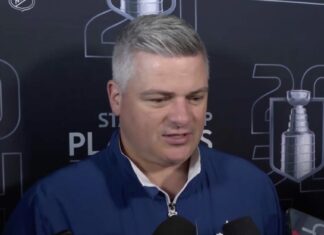This past Saturday, The Fourth Period discussed on their radio segment the possibility of the Toronto Maple Leafs trading Tomas Kaberle at some point this season, if the team’s fortunes do not begin to improve.
The topic itself is not exactly news; talk of Kaberle being moved for some sort of tantalizing return or another has been commonplace in Toronto during the past couple of seasons. What is interesting, however, is the timing. Kaberle has been on a statistical tear to begin the year, leading all NHL defensemen with 17 points (2g, 15a) in 12 games. Coming off a disasterous 2008-09 campaign, Kaberle is back on the collective radars of several teams who believe a top-flight offensive blue-liner may be the final piece to their puzzle.
Despite Kaberle’s torrid pace, the Maple Leafs still sport a 1-7-4 record. Which begs the question: might this be the best time to trade him? A case can be made that his value may be at its maximum right now, considering his offensive output and the fact that his +/- rating is only -3 on the team with the league’s highest number of goals against per game.
Now, one might counter this by arguing that the Maple Leafs would have to find a way to replace Kaberle if they were to trade him. Brian Burke made that exact argument a season ago. No one will dispute that he had, at the time, a valid point: Kaberle was under contract for two more seasons at a very affordable rate, and if the team were to pursue a free agent to replace him (e.g. Jay Bouwmeester, who wound up signing with Calgary via a trade of his negotiating rights), that player’s contract would be far more expensive — and carry a much greater cap hit — than Kaberle’s existing deal.
But that was then, and this is now — and Brian Burke certainly did not anticipate a one-for-October start to the season. Kaberle is only under contract for one more season following this campaign. Most would agree that playoffs this season, while not an impossibility, will be a steep uphill battle. If that is indeed the case, what are the odds the Leafs are a contending club in 2010-11, the last season of Kaberle’s deal? Does the team want to take the risk that he walks at the end of that year in search of an opportunity to win elsewhere?
Hence the growing argument to trade him sooner rather than later. At the end of his deal in 2011, the team will have to either (a) replace him with a free agent (unless they get very lucky in the draft), or (b) sign him to an extension that will be in the same neighbourhood as a free agent signing on the open market. Some have suggested that the worst thing the team could do would be to wait until the 2011 trade deadline to make a decision on his future (which would be made based on the team’s progress to that point), and that the decision should instead be made this season to allow the team time to move forward with a clear plan for the future.
The argument to trade him this season (as opposed to waiting until next year’s trade deadline) goes something like this:
- Logic would indicate that a player’s trade value will be higher when the destination team will get an additional year of his services; chances are the Leafs would not receive quite as much in exchange for Kaberle when he is a year older and a pending free agent.
- The Leafs have a fair amount of cap space opening up this offseason to pursue free agent help ($22m comes off the books in the form of pending UFAs, some of whom will be replaced by current Marlies); trading Kaberle would free up an additional $4.25 million.
- Kaberle would return at minimum a much-desired 1st round pick and a top prospect. It is not a stretch to suggest the return could be even greater if the Leafs were able to time the deal properly (buyer in need + Kaberle maintaining his exceptional play at the time of the deal).
Of course, all of this is moot if Kaberle decides to exercise his no-trade clause. However, word on the grapevine is that he may not be as opposed to doing so this time around, not only due to the slow start to the season but also due to the team’s repeated attempts to trade him in the past, notably the near-deal with Boston this offseason when his NTC did not apply.
The bottom line is, the Leafs have a number of holes to fill prior to becoming a contending team. How they go about filling those holes is question. A strong case can be made that Kaberle could bring about the sort of return that could fill those holes, although it would create another in the process.
And therein lies the conundrum. What do the Maple Leafs do with Tomas Kaberle? They have spent the better part of the past decade building around him, but have had little success to show for it. Clearly, much more is needed than a top-flight offensive defenseman for any team to be able to compete. But, a top-flight offensive defenseman is nevertheless a key component of any championship-calibre team. And thus the team finds itself facing a most intriguing catch-22 situation.
The team could elect to hang onto Kaberle, and attempt to extend his contract prior to his becoming a free agent (although odds are he would elect to test the market, which would present a perilous situation for the Maple Leafs to say the least). If the Leafs do indeed decide to hang onto him, will they be able to fill their many needs via the free agent market? Who else is a tradeable commodity that can bring an impactful return? And can the team count on finding a gem or two in the later rounds of the draft, given their lack of top-round picks for the next two years?
The flip side of the coin is, as Brian Burke has mentioned several times in the past, if the team elects to move Tomas Kaberle they would eventually have to find a way to replace him. A glaring hole in the current organization is the lack of mobile offensively-skilled defenders in the system. Is Ian White capable of holding down a top-pairing role, and running the first-unit powerplay, over the course of a full season? Could the Leafs find a top-flight offensive defenseman in the draft, or on the free agent market? And if they did find one as a free agent, would the financial commitment required be so high as to restrict the team’s ability to shore up its talent in other areas?
It’s not so simple a decision, is it?
There are no easy answers. What there is, however, is a growing consensus among observers that a trade may be the best option for the future growth of the organization … if (and only if) the return is beneficial to the long-term interests of the club. Which equates to some sort of high draft pick/top prospect combination. Given Kaberle’s torrid pace to start this season, such a return may not be as unrealistic now as it appeared last season (which just so happened to be among the worst of his career).
Now, some will suggest that a trade of the team’s top player would be tantamount to making a panic move. But is it really? The million-dollar question is, where will the Leafs be at the end of the 2010-11 season when Kaberle becomes a much sought-after free agent?
If conventional wisdom puts the Leafs 2-3 years away from being a team that can be a contender, what are the odds Kaberle will still be wearing the blue & white by that time? There is a very realistic chance he could be lost in the free agent market two offseasons from now, and a very strong case to be made that his trade value will be higher this season — with another year remaining on his deal — than it will be next season when he is a pending UFA.
Simply put: If the odds appear stacked against the player remaining with the team by the time it is ready to contend, does it not make sense to move him when his trade value is at the highest it will be for the remainder of his contract? When the team has failed to win with the player in its lineup throughout his career, is it time for each to cut the cord and move another direction?
I don’t know what the answer to that is, but it is certainly a question worth thinking about as the season continues to move forward.
garrettbauman@www.mapleleafshotstove.com
twitter.com/garrettbauman

































